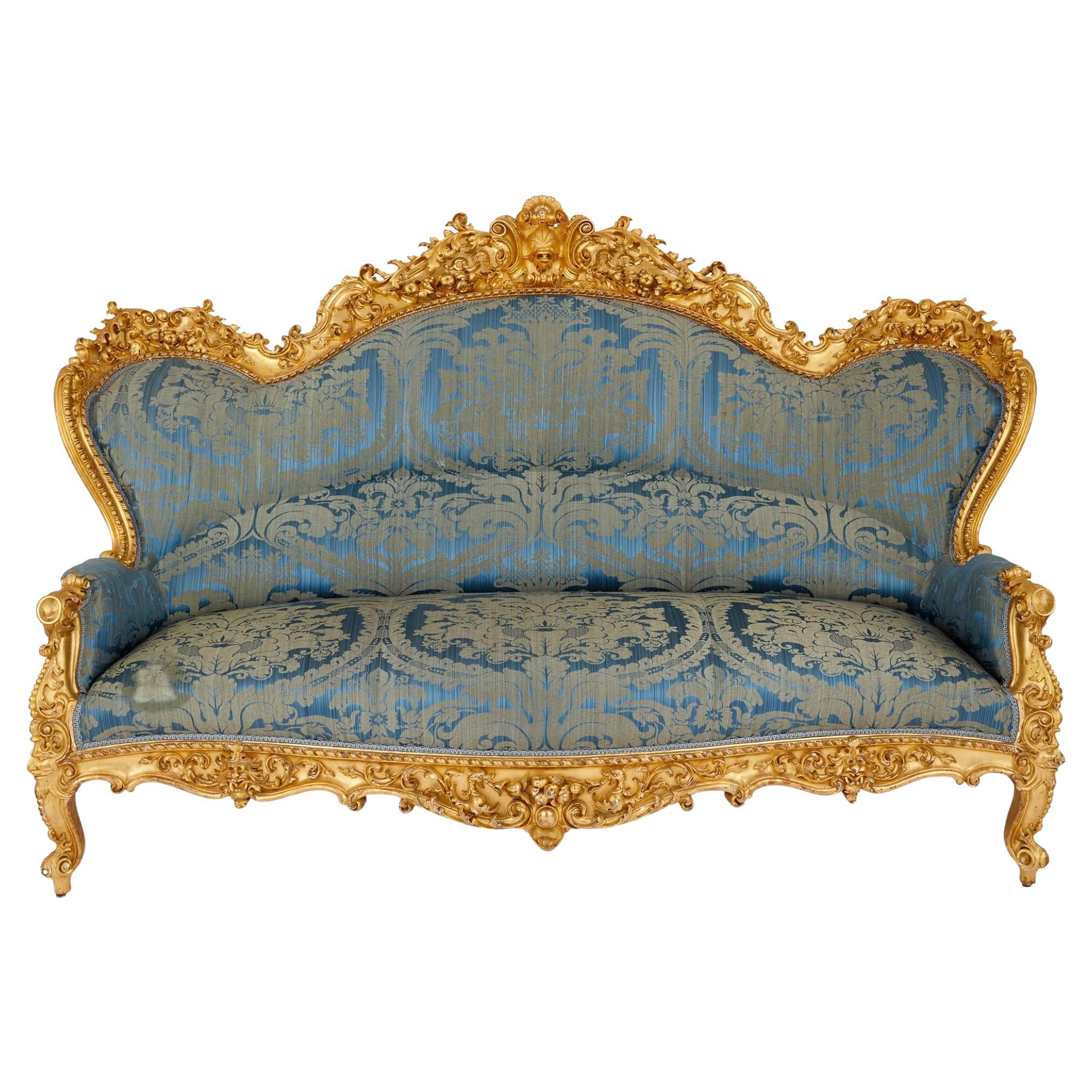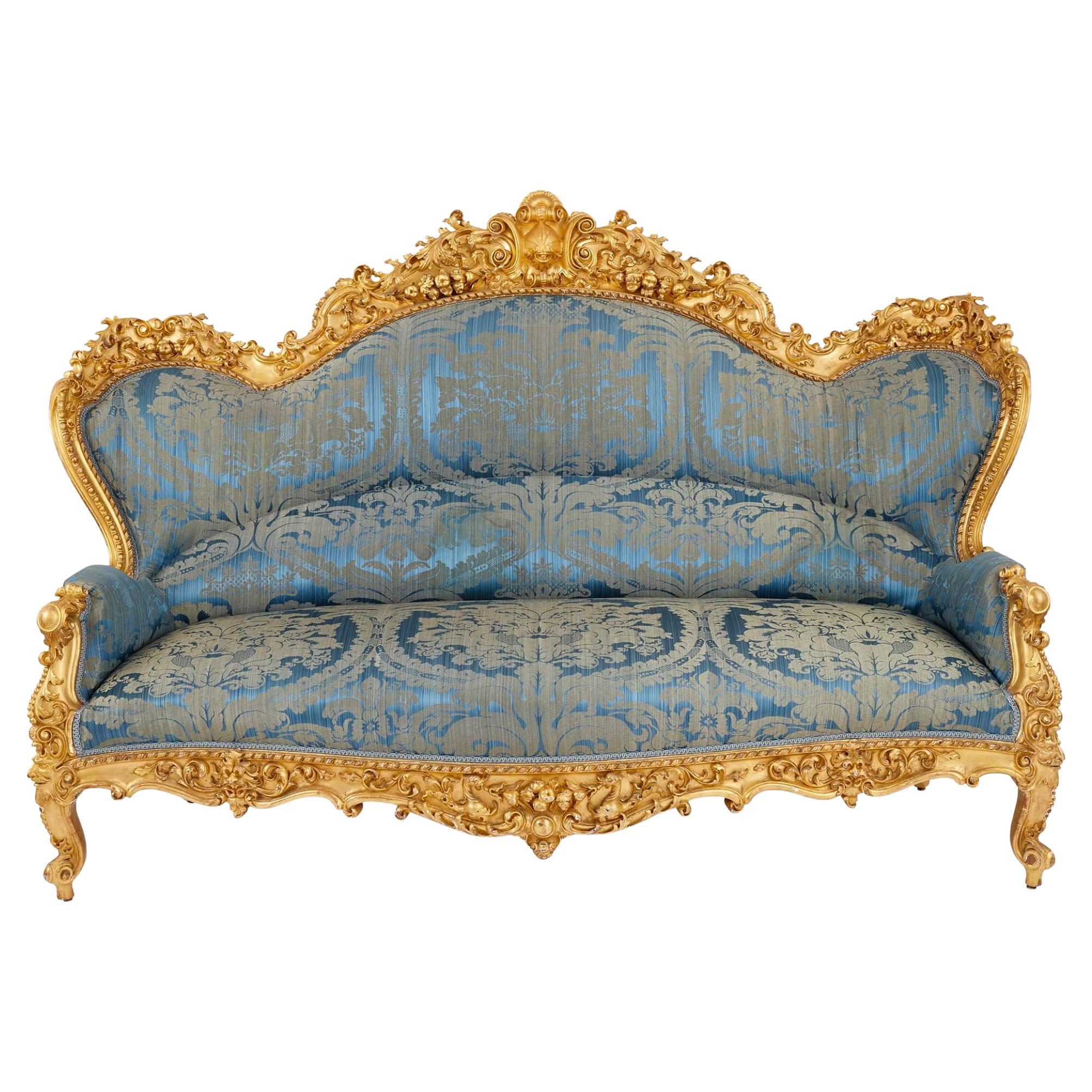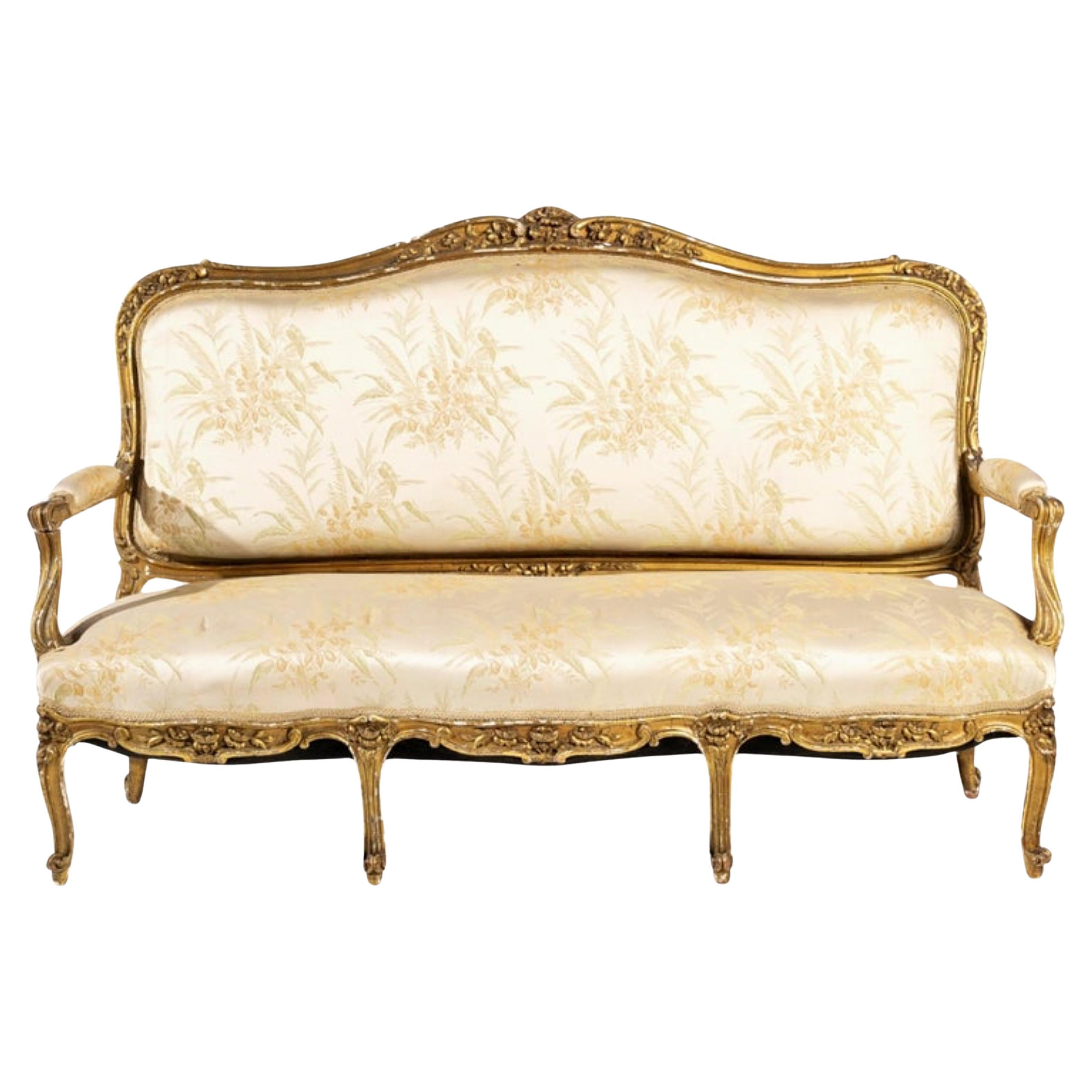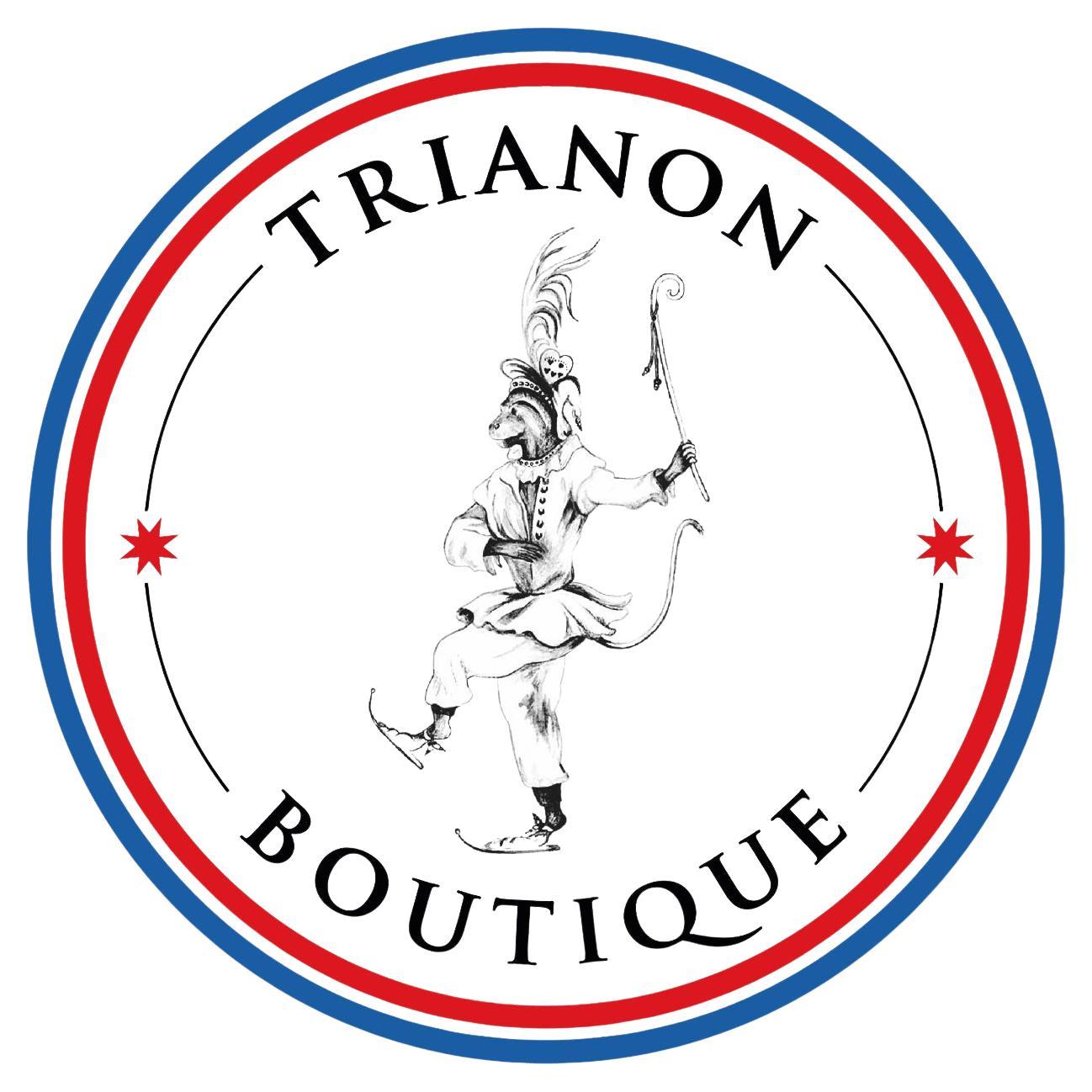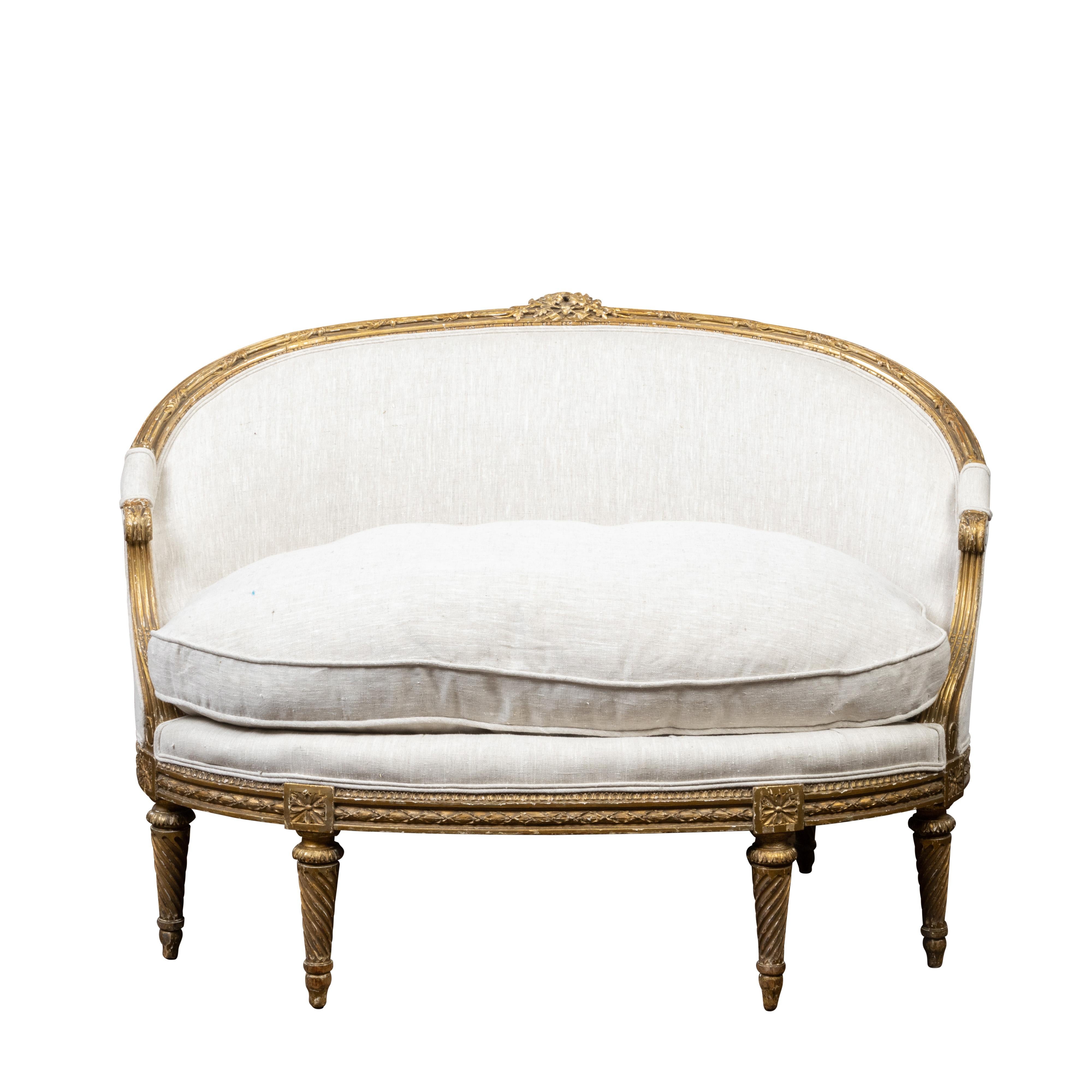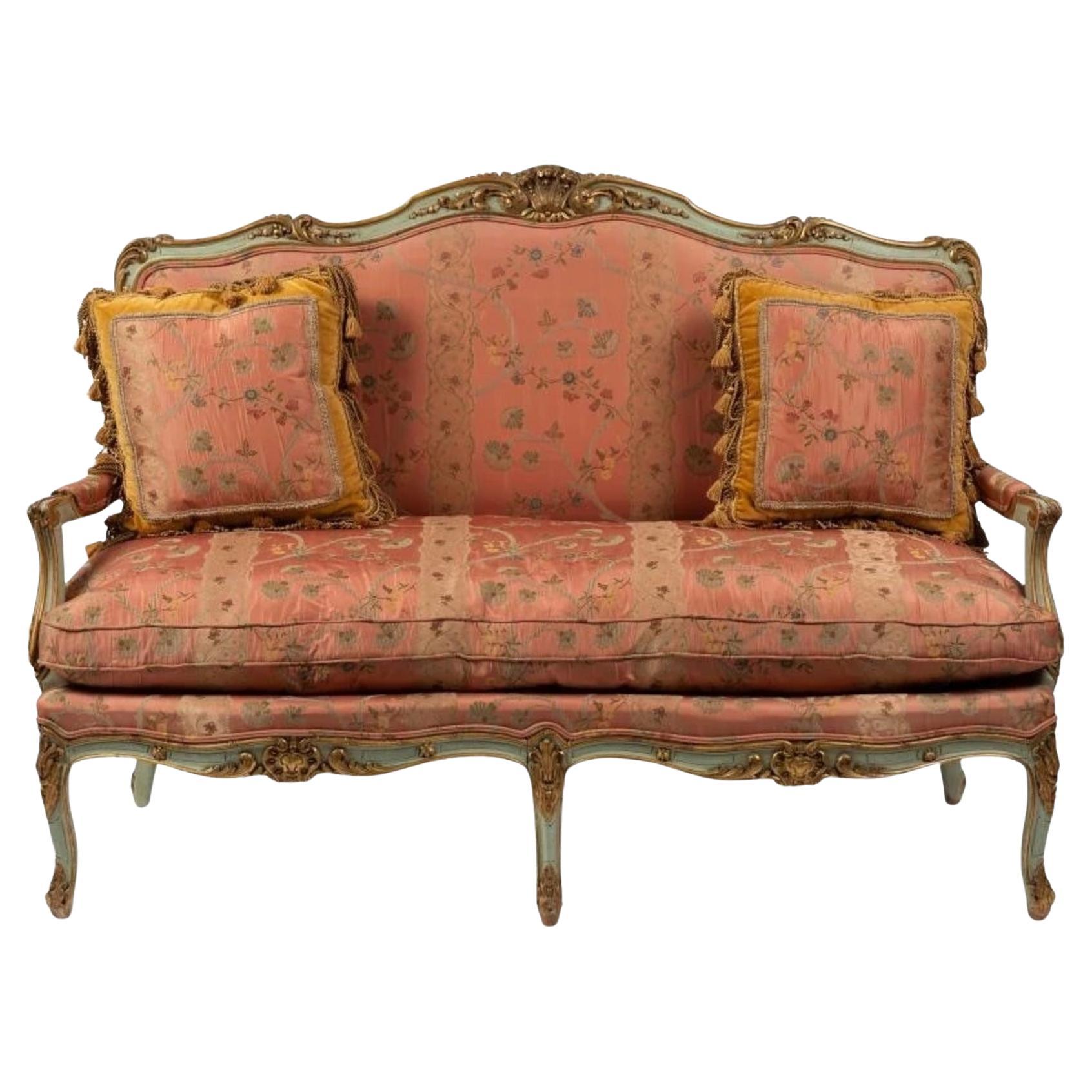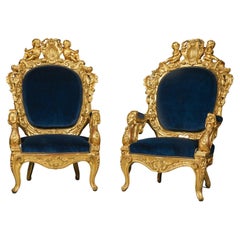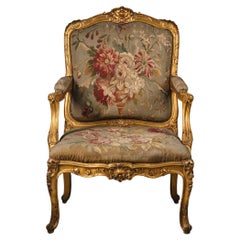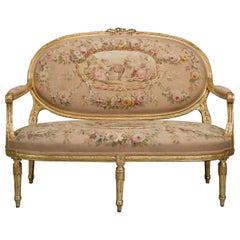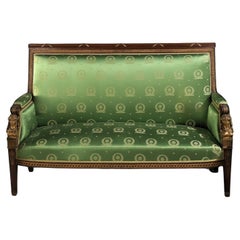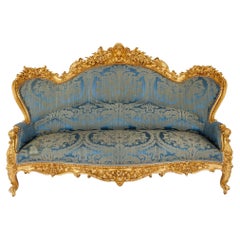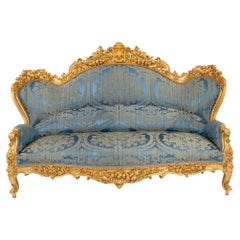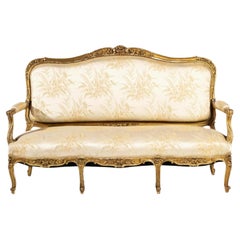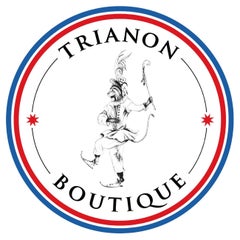Items Similar to A Palatial Neo-Rococo Giltwood Canapé
Want more images or videos?
Request additional images or videos from the seller
1 of 9
A Palatial Neo-Rococo Giltwood Canapé
$89,252.90
£65,000
€76,074
CA$123,130.62
A$135,354.43
CHF 71,136.08
MX$1,643,695.79
NOK 887,404.73
SEK 840,753.58
DKK 567,759.48
About the Item
A Magnificent and Palatial Neo-Rococo Giltwood Canapé.
The top rail exuberantly carved with a trumpeting putto seated in a conche shell surrounded by acanthus leaves and flanked by fruiting vine branches with an ermine and an eagle. The open arms with padded armrests and chimera headed terminals. Raised on a scrolled feet with rocaille and acanthus carved serpentine seat rail. The cartouche shaped padded back and sprung seat upholstered in flower pressed blue velvet.
South Italian, Circa 1880.
- Dimensions:Height: 60.63 in (154 cm)Width: 80.71 in (205 cm)Depth: 27.56 in (70 cm)
- Style:Rococo (In the Style Of)
- Materials and Techniques:
- Place of Origin:
- Period:
- Date of Manufacture:Circa 1880
- Condition:Wear consistent with age and use.
- Seller Location:Brighton, GB
- Reference Number:Seller: B778211stDibs: LU1028040525132
About the Seller
5.0
Recognized Seller
These prestigious sellers are industry leaders and represent the highest echelon for item quality and design.
Established in 1964
1stDibs seller since 2014
58 sales on 1stDibs
Typical response time: 6 hours
Associations
The British Antique Dealers' AssociationLAPADA - The Association of Arts & Antiques Dealers
- ShippingRetrieving quote...Shipping from: Brighton, United Kingdom
- Return Policy
Authenticity Guarantee
In the unlikely event there’s an issue with an item’s authenticity, contact us within 1 year for a full refund. DetailsMoney-Back Guarantee
If your item is not as described, is damaged in transit, or does not arrive, contact us within 7 days for a full refund. Details24-Hour Cancellation
You have a 24-hour grace period in which to reconsider your purchase, with no questions asked.Vetted Professional Sellers
Our world-class sellers must adhere to strict standards for service and quality, maintaining the integrity of our listings.Price-Match Guarantee
If you find that a seller listed the same item for a lower price elsewhere, we’ll match it.Trusted Global Delivery
Our best-in-class carrier network provides specialized shipping options worldwide, including custom delivery.More From This Seller
View AllA Pair of Magnificent Giltwood Armchairs
Located in Brighton, West Sussex
A Pair of Magnificent Giltwood Armchairs.
Each magnificent throne chair with oval padded back encircled by an elaborate cresting carved with flowering acanthus, oak branches, and fleurs-de-lis. The top rail with two putti holding an armorial star-shaped cartouche with the interlaced L's of Louis XVIII, King of France, titled ‘Bordeaux 12 Mars 1814’, beneath a crown. This armourial cartouche is the Order of the Armband of Bordeaux.
The open arms with padded armrests above exuberantly carved sculptural terminals depicting dragons with human faces. The shaped seat rail with ribbon and rocaille ornament and to the front with a star representing the Décoration du Lys. On cabriole legs. Upholstered in flower pressed blue velvet.
France, Circa 1820/30.
These magnificent throne chairs commemorate an important event in the Bourbon Restoration precipitating the fall of Napoleon I. They celebrate the surrender of the city of Bordeaux to royal power and to King Louis XVIII (1755-1824), heralding the fall of the first Empire (1804-1815). The Duc d'Angoulême (1775-1844), nephew of Louis XVIII and elder son of Charles X, entered the city of Bordeaux to the acclaim of the crowd on 12th March 1814.
Louis XVIII later called it ‘the happiest event of my life’ and on the 29 September 1820 named the heir to his throne, not—like previous Bourbon heirs—Duc de Bretagne, or de Bourgogne, but the Duc de Bordeaux.
This armourial cartouche to the top rail of these chairs is the Ordre du Brassard de Bordeaux (The Order of the Armband of Bordeaux). It was adopted for the Royal Guard and volunteers who accompanied the Duc d'Angoulême when he entered Bordeaux on 12th March 1814. It was officially called the Brassard de Bordeaux, or Brassard Vert. At first it consisted of a silk band of green with white borders, worn, as the name signifies, on the arm, but was later adapted as a medal with oval gilt sunburst on which is superimposed an oval medallion of white enamel bearing the royal monogram ‘L.L.’, and surrounded by a green enamelled band with the words ‘BORDEAUX 12 MARS 1814’. The whole is surmounted by the royal crown. In 1824 the issue of the Brassard de Bordeaux was controlled by the Royal Order of...
Category
Antique Early 19th Century French Rococo Armchairs
Materials
Giltwood
Napoleon III Carved Giltwood Armchair
Located in Brighton, West Sussex
A fine Napoleon III Carved Giltwood Armchair In The Manner of Michel-Victor Cruchet.
This fine fauteuil is richly carved with foliage, shells and 'C'-Scrolls and is upholstered 'a chasis' with floral Beauvais tapestry.
The generous proportions, ornamentation and the modified Louis XV style of this grand fauteuil is in the manner of Michel Victor Cruchet who supplied related chairs to the Duke of Nemours for the Pavillon de Marsan in 1842.
French, circa 1850.
Michel-Victor Cruchet
Michel-Victor Cruchet (1815-1899), was a celebrated sculptor, carver and ornamentalist. Working with the cabinet-makers Ringuet-Leprince, Thuiller and Maigret he was a supplier of the Garde-meuble providing many pieces of furniture to the households of both King Louis-Philippe and Emperor Napoleon III.
Important commissions included audience seating for the Duke of Nemours at the Pavillon de Marsan, in a neo-Louis XV style; Gothic furniture for the Tuileries Palace for Princess...
Category
Antique 19th Century French Napoleon III Armchairs
Materials
Tapestry, Giltwood
Louis XVI Style Canapé Upholstered with Aubusson Tapestry, circa 1880
By Aubusson Manufacture
Located in Brighton, West Sussex
A Louis XVI style Canapé, upholstered with Aubusson tapestry depicting a scene from Aesop’s Fables.
French, circa 1880.
The small town of Aubusson, on the River Creuse in France, had a long history of producing elaborate and costly tapestries. They were known for their elegance and delicate colouring and often depicted romantic pastoral scenes derived from artists such as Boucher; historic scenes, inspired by classical mythology; or more formalized architectural vistas.
Aubusson was particularly noted for its finely balanced compositions of garlands and bouquets which became famous and sought after throughout Europe.
Aesop was by tradition a labourer who was a contemporary of Croesus and Peisistratus in the mid-sixth century BC in Ancient Greece. The various collections that go under the rubric "Aesop's Fables" are still taught as moral lessons and for centuries have been influential subject matter for artistic endeavour.
The Shepherd Boy and the Wolf:
In a village was a young boy who had a job watching the village's sheep. Two times he called out, "Wolf! Wolf!" Each time the villagers came running to help the boy. And both times the boy just laughed at the villagers and called them names. But then the wolf really did come and start eating the sheep. The boy called, "Wolf! Wolf!" but the villagers just ignored his calls. They thought he was just trying to trick them again. The wolf took his time and had a huge meal of the entire flock of sheep.
The Wolf in Sheep's Clothing:
Once upon a time there was a wolf who decided to disguise himself so he could get some food without working too hard. He took a sheep's skin and hung it over his body. Then he went into the sheep pasture and pretended to graze with the sheep. He fooled everyone. Even the shepherd didn't realize she had a wolf grazing with her sheep. Soon the shepherd moved the sheep into the barn and the wolf went with them. The barn door was closed and locked and the wolf was just about ready to have a nice meal when the shepherd came back. She decided she wanted some food for her meal. She grabbed the wolf who was still disguised as a sheep and killed him for her meal.
The Wolf and the Crane:
One day a wolf had a bone stuck in his throat. He called to a crane and hired him for a large sum of money to put her head in his mouth and remove the bone. The crane did as she was hired to do and got the bone out and then asked to be paid. The wolf just grinned and said, "Ha! You've already been paid. I let you take your head safely out of my mouth when I could have crushed you with my powerful jaws”.
The Wolf and a Mountain Goat:
One day a wolf looked up and saw a mountain goat eating on a ledge high up on the side of a steep mountain. The wolf called out to the goat, "You should come down here to eat, you might fall if you stay up there. And the grass is very tender down here." But the mountain goat was too smart for the wolf and called back, "I don't think you are worried about my dinner. You are just looking for your own food!"
The Wolf and the Lamb...
Category
Antique Late 19th Century French Louis XVI Canapes
Materials
Tapestry, Giltwood
A Fine Mahogany And Gilt-Bronze Second Empire Canapé
Located in Brighton, West Sussex
A Fine Mahogany And Gilt-Bronze Second Empire Canapé in the Manner of Jacob-Desmalter, having armrests headed by finely cast caryatid herms.
French, Circa 1880.
Category
Antique 19th Century French Empire Revival Canapes
Materials
Ormolu
Pair of Louis XVI Style Giltwood and Sèvres-Style Porcelain Mounted Salon Chairs
Located in Brighton, West Sussex
A Pair of Louis XVI Style Giltwood and Sèvres-Style Porcelain Mounted Salon or Bedroom Chairs
These charming chairs are delicately carved and adorned with attributes of love. The to...
Category
Antique 19th Century French Louis XVI Chairs
Materials
Porcelain, Giltwood
Pair of Empire Style Carved Giltwood Tub Chairs with Green Velvet Upholstery.
Located in Brighton, West Sussex
An Important Pair of Empire Style Carved Giltwood Tub Chairs with Green Velvet Upholstery. The Lion Monopedia side supports feature finely carved detail and a realistic pose.
These...
Category
Antique 19th Century French Empire Armchairs
Materials
Velvet, Giltwood
You May Also Like
Large Rococo Revival Carved Giltwood Sofa
Located in London, GB
A large Rococo revival carved giltwood sofa
French, Late 19th Century
Height 135cm, width 196cm, depth 90cm
This excellent antique piece is a large...
Category
Antique Late 19th Century French Rococo Revival Sofas
Materials
Upholstery, Giltwood
Large French Rococo Revival Style Giltwood Sofa
Located in London, GB
Large French Rococo Revival style giltwood sofa.
French, late 19th century.
Measures: height 135cm, width 196cm, depth 90cm.
This remarkable piece is a large, French, Rococo rev...
Category
Antique Late 19th Century French Rococo Revival Sofas
Materials
Upholstery, Giltwood
Beautiful French Canape 18th Century
Located in Madrid, ES
Beautiful French Canape 18th Century
French from the 18th century,
in carved and gilded wood.
Upholstered seat, back and arms.
Dim.: 112 x 169 x 60 cm.
good condition
Category
Antique 18th Century French Rococo Canapes
Materials
Wood
French Giltwood Canapé Attributed to Georges Jacob
By François-Honoré-Georges Jacob-Desmalter
Located in Montreal, Quebec
Rare and exceptional piece. This large and beautiful sofa is a fine example of the work of famed menuisier Georges Jacob (6 July 1739 – 5 July 1814), who was one of the two most prom...
Category
Antique 18th Century French Louis XVI Canapes
Materials
Velvet, Giltwood
$19,200 Sale Price
20% Off
French Louis XVI Style 19th Century Giltwood Upholstered Canapé en Corbeille
Located in Atlanta, GA
A French Louis XVI style giltwood canapé en corbeille from the 19th century, with carved flowers and new upholstery. Created in France during the 1...
Category
Antique 19th Century French Louis XVI Canapes
Materials
Upholstery, Giltwood
A Louis XV Style Carved And Painted Salon Canapé, 19th Century
Located in ARMADALE, VIC
A Louis XV Style Carved And Painted Salon Canapé, 19th Century
The frame painted in muted celadon colours with carved details picked out in gilt, lavishly upholstered in antique sty...
Category
Antique 19th Century French Louis XV Canapes
Materials
Wood
More Ways To Browse
Pressed Flower
Antique Chimera
Boucle Cushion
Bronze Spear
Brutalist Wood Stool
Calacatta Marble Coffee Table
Caned Coffee Table
Cast Iron Marble Table
Cut Glass Wine Glasses
Danish Mcm Furniture
Danish Neoclassical
Directoire Brass Table
Dutch Voc
Dux Swedish Chair
Ecclesiastical Art
Element Sofa
English Mahogany Pedestal Dining Table
Exotic Wood Tables
